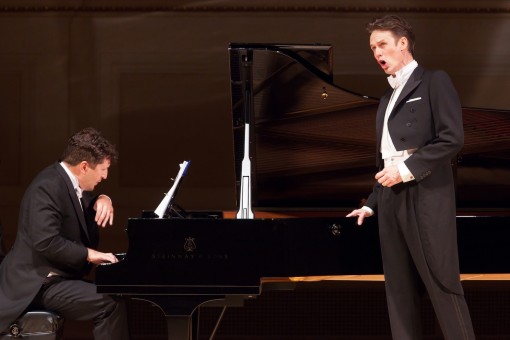Bostridge and Adès deliver a spell-binding bardic evening at Carnegie Hall

Ian Bostrdge performs with composer-pianist Thomas Adès Monday night at Carnegie Hall. Photo: ©2011 Chris Lee
A long, long time ago, poetry and music were one. King David and the Homeric bards sang. The Latin word carmen denoted both “poem” and “song.” The troubadours, wandering minstrels, gave the world the sonet or “little song,” the poetic form brought to perfection by Petrarch. As far as we know, the fourteenth-century Tuscan did not sing, though posterity styled his “scattered rhymes” a canzoniere or “song-book.”
The music of Petrarch’s poems and their enduring themes of loss, obsession, and the splintering of the self in love were at the center of Monday’s Carnegie Hall recital by the tenor Ian Bostridge and the composer and pianist Thomas Adès. They were central literally: at mid-program, Adès played Franz Liszt’s piano arrangement of I’ vidi in terra angelici costumi, his earlier vocal setting of a Petrarch sonnet. And they were central figuratively, as well, a ghostly echo in the angry and despairing songs that made up a spellbinding evening of music.
Adès played Liszt’s wordless Petrarch sonnet as he played everything in the program, with breathtaking mastery, his performance a thing of inward and velvety beauty. In Adès’s hands, the texture of Liszt’s music was overripe and teetered on the edge of disintegration, its trills dissolving into splashes of light, its final note dying away in a whisper.
Susurrations, this time spiked with angry, icy stabs, also sounded in Adès’s own Darkness Visible (1992). The title is a nod to John Milton’s “waste and wild” netherworld, and its bleak and desolate music is an “explosion” (Adès’s word) of In darkness let me dwell, the song by John Dowland that opened the program.
Self-proclaimed vocal connoisseurs sometimes dismiss Ian Bostridge, Adès’s partner in poetry, as an anemic and overgrown choirboy. But judging by the rapt attention and tumultuous applause that he drew on Monday, Bostridge’s fierce intelligence and musicianly singing are no less prized today than a Heldentenor’s muscle or Pavarotti’s honeyed sound.
In the Dowland song, his voice swelled out of nothingness and slipped back into silence to wondrous effect, at one with the “woes” and barren wakefulness evoked by the seventeenth-century master. It rose to a queasy falsetto in György Kurtág’s Höderlin: An…, flirted with acid blackness in Robert Schumann’s Dichterliebe, and grew wan and distant in the “dark dreams” of Franz Schubert’s Ihr Bild.
Not everything was perfection. Bostridge’s tone sounded several sizes too small for the mythical Titan of Schubert’s Der Atlas. Die Rose, die Lilie, die Taube, die Sonne from Schumann’s cycle came forth not as a breathless rush but as a muddy jumble. And for all their excellence, not even Bostridge and Adès could make much of three Liszt songs.
Still, how boldly they re-visioned Dichterliebe. The title means “poet’s love,” and the texts by Heinrich Heine, a distant heir of Petrarch, revisit in their own way the heartbreak and mocking landscapes through which the elder poet wandered. (The sonet makes an appearance, too, in the form of Heine’s Liedchen or “little song.”) The cloying sweetness in which some musicians steep these songs was gone, and replaced with black bitterness and torment.
To be sure, there was beauty aplenty—in Bostridge’s youthful, blooming tone as the cycle opened, and in the silken rapture that Adès made sound in its postlude. But the “wondrous month of May” came to an unsettled end, and the spare, menacing accompaniment in Hör’ich das Liedchen klingen seemed to trap the grieving singer like a cage. And that magical postlude was stained with drops of corrosive and lovely pain.
Bostridge and Adès gave similarly eloquent performances of Heine settings by Schubert, none more so than Der Doppelgänger, a nightmare in which the poet is not immortal but simply undead, etched in inky horror by pianist and singer.
Carnegie Hall’s “Great Singers” series continues with recitals by Susan Graham and Malcolm Martineau on February 1, 2012 and Matthias Goerne and Leif Ove Andsnes on May 1, 2012. carnegiehall.org; 212-247-7800.
Posted Nov 29, 2011 at 3:11 pm by Reality
Fischer-Dieskau could get away with a less than great voice as his interpretation was masterful. Bostridge’s voice was (is) weak, and his interpretation was tired. He made it quite obvious that he wasn’t feeling well, and the “tumultuous” applause he (they) received was simply a tribute to the fact that he persevered through what seemed to be a nasty cold, and the audience appreciated this fact.
“Bostridge’s fierce intelligence and musicianly singing are no less prized today than… Pavarotti’s honeyed sound.” Are you related to Bostridge or are you crazy? Compared to those who have graced the stage at Stern Auditorium over the past two years, Terfel, Fleming, Quasthoff, Daniels, etc., Bostridge was nothing more than disappointing. What is worse than a “self-proclaimed vocal connoisseur” is a pseudo-intellectual.
Posted Nov 29, 2011 at 7:58 pm by sid
These are great songs those Dichterliebe, your writing makes me want to have heard..I see as much love for music in the writer of the review as in the music, which is a refreshing change from critis who come to criticize, not love and show the worth as well as the human errors, the original meaning of critic..
Nice to see writing also from someone who knows her language, rarer and rarer from all I’ve seen and in the post Bush and Reagan’s destruction of the American education system. Kudos.